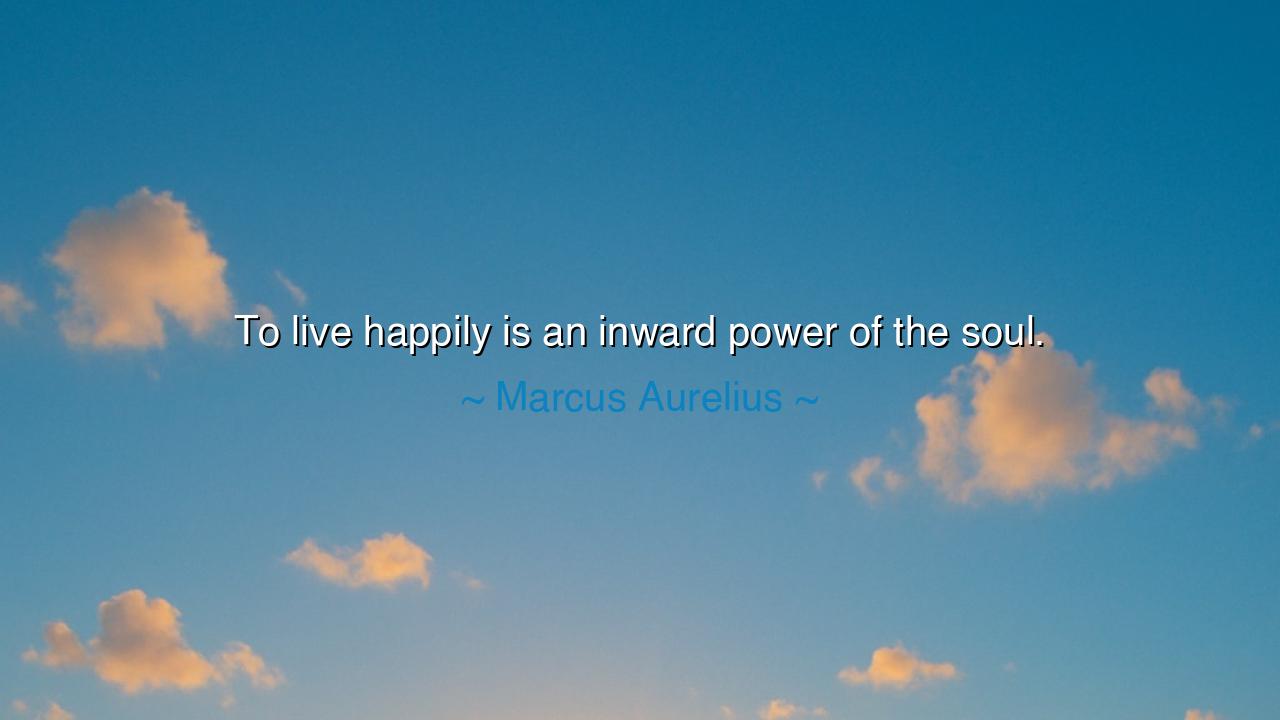
To live happily is an inward power of the soul.






Marcus Aurelius, the philosopher-emperor, proclaims: “To live happily is an inward power of the soul.” These words are forged in the fire of Stoic thought, where joy is not chained to fortune’s wheel, nor subject to the favor of kings, but found within the fortress of one’s own spirit. Happiness is not granted by gold, nor stolen by poverty, nor shattered by suffering—it is a power that resides within, a light kindled in the soul that no storm may extinguish.
The meaning is as sharp as it is liberating. The multitude chase happiness in external things—riches, titles, pleasures, and the applause of men. But these are fleeting and uncertain, tossed about like leaves in the wind. Marcus teaches that true power is inward, rooted in the governance of the mind, in the discipline of thought, and in the harmony of the soul with reason and virtue. What the world grants, the world may take away; but what the soul commands, none can touch.
History offers us countless examples of this truth. Consider Epictetus, the slave turned sage, who though bound in chains declared himself freer than his masters. Beaten, sold, and humiliated, he discovered that though his body could be constrained, his soul’s power to choose his response could never be taken. In this freedom, he found peace greater than any lord could purchase, proving Marcus’s words before Marcus himself was born.
This teaching is also a shield against despair. When calamities strike, when wealth is lost, when friends betray, the unwise fall into misery, thinking happiness slain. But the Stoic sage reminds us: happiness was never in those things—it was always within. It is the quiet strength that allows the man in rags to smile, and the ruler of empires to bear his burdens with dignity. To live in accord with one’s nature, with virtue as compass, is to possess a joy that even death cannot undo.
Therefore, let the seeker of truth remember: the inward power of the soul is the greatest treasure. Guard it, cultivate it, strengthen it, and no tyrant, no misfortune, no cruelty of fate shall rob you of your peace. For to live happily is not the gift of fortune, but the victory of the spirit over all that seeks to enslave it. And this victory belongs to all who dare to master themselves.






XQpham xuan quynh
I love the serenity in this message—it feels like a gentle reminder to stop seeking joy in circumstances. Still, I’m curious: is happiness purely internal, or does it bloom through meaningful relationships and purposeful living? The Stoics often emphasize detachment, but modern psychology values connection. Maybe the truth lies somewhere in between—that the soul’s power creates happiness when it knows peace within and harmony without. Can inward strength coexist with outward love?
UGUser Google
This thought feels timeless, yet I find myself questioning what it really means to have happiness as an inward power. Does it imply emotional independence, or something deeper, like moral alignment with one’s values? If happiness is a power, does it require practice, like a muscle of the soul? I think Aurelius might be urging us to cultivate awareness and gratitude, but I wonder—how many people ever truly master that art?
T439. Quoc Thai To 4
I think there’s a quiet truth in this. It reminds me that no one can give or take happiness unless we let them. Yet I wonder, does this belief risk overlooking social or emotional realities—like trauma or injustice—that can crush the soul’s power? It’s inspiring, but maybe incomplete. Could it be that happiness is an inward power that also needs external harmony—kindness, fairness, and connection—to fully thrive?
TLTu luong
What stands out to me here is the idea of happiness as a kind of spiritual strength. It suggests that contentment isn’t passive; it’s an active discipline. I love that notion, but it also feels daunting. How do we build that inner power without becoming detached from the world? Perhaps the challenge lies in finding balance—being inwardly stable while still emotionally engaged with life’s ups and downs. Is that what Aurelius meant by true happiness?
VHvi Huynh
This quote resonates with Stoic philosophy so beautifully—it’s about self-mastery and inner peace. But I can’t help but question how practical it is in times of real hardship. If happiness is entirely inward, does that mean external suffering should have no effect on us? That feels nearly impossible. Maybe Aurelius is challenging us to differentiate between fleeting pleasure and deep serenity—the kind that comes from aligning our soul with reason and virtue.